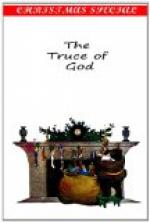Margaret endeavored to thank him, but, exhausted by excitement and exertion, she fell back upon her pillow. The countess prudently led the unresisting father from the room, and despatched Henry to administer to his grief.
“I am changed,” said Margaret to the missionary, as she recovered.
“God has changed you for Himself, my child,” replied the old man, struggling with the weakness of human nature, for he had known and loved her from her infancy.
“I have hoped so, even in the recollection of my many sins, for His mercy is infinite. May He uphold and strengthen my father, and teach him to rejoice in the change he now deplores!”
The countess left the room, and once more the Lady Margaret opened her soul to her first confessor.
The baron knelt all night beside his dying child. He watched her broken slumbers, as if he feared each might be the last. A thousand sighs of anguish and affection were given and returned before another day began to dawn. How precious are the last hours of life! In our inability to lengthen them, we strive to gather into them more feeling and action than we could extract from as many years.
As the sun flashed out the Lady Margaret seemed animated with new strength. Her father trembled at the suggestion—what if she should recover! Thus hope feeds upon the wishes of the heart.
An hour before noon the Count Montfort, accompanied by Albert of Hers, entered the apartment. Sir Albert, obeying a look which the maiden gave him, advanced, and with much emotion pronounced the words, “My lady, I am here!”
Sir Sandrit had anticipated all; nor did his son manifest the least surprise. They both stood sorrowful and mute, nor did anger and disdain appear in the features with which they were so familiar. Albert of Hers saw, at a glance, the position in which he was placed.
“Father!” began the sinking girl—“father! let me die in the assurance of meeting you hereafter. In the name of Him before whom I am soon to appear, forgive this man!”
The struggle had already taken place in the baron’s soul. When his heart was trampled in the dust, his pride was broken. The stubborn rock was smitten by the heaven-directed wand, and the waters of contrition gushed forth.
“You have conquered, my child,” he murmured, kneeling and kissing her pale forehead.
“Not I, my father. God is the conqueror!”
It seemed as if her upward glance had rested upon something more than mortal, her face assumed an expression of such unearthly meaning. Sir Albert, too, knelt beside his ancient foe: he felt it impious to stand.
The maiden motioned to the countess, who raised and supported her in her arms and drew back the long hair which had partially covered the hollow cheeks. Without a word, but with an eloquence that must have charmed the attendant Angels as much as it entranced the mortals who witnessed it, she placed her father’s hand into Sir Albert’s right hand, while Henry took the left.




